Many pet parents struggle with watching their animals age. It’s easy to forget that your pup is approaching their golden years, and isn’t quite a ‘pup’ anymore! As they get older, keeping an eye out for certain things you may not have even thought about in the past becomes more important than ever. We put together a few tips to help you care for your aging friend and keep them in great shape, no matter how old they are!
- Remember your dog’s teeth. Dental hygiene is particularly crucial as your dog ages. Regular brushing and professional cleaning can prevent painful dental disease and decay. If your dog doesn’t enjoy having his/her teeth brushed, consider dental treats and toys instead. Head over to Rens Pets Depot and consult one of their awesome staff members for product suggestions!
- Watch your dog’s diet. Mature dogs often have food issues, including problems chewing, lack of appetite, obesity and digestive difficulties. Consult with your vet on the best diet and exercise plan for your aging dog. Dietary changes may include adding more fiber to aid with digestion or decreasing carbohydrates to maintain optimal weight. Supplements such as fish oil or glucosamine can be added to alleviate muscle and joint pain.
- Exercise your dog’s body and mind. Like people, aging dogs experience pain and have difficulty performing physical activities they used to enjoy. However, exercise continues to be imperative to their health and well being. Take your dog on short, gentle walks and monitor his/her breathing and look for any limping, to make sure nothing is amiss. Your dog’s brain needs plenty of exercise as well. Stimulating toys such as food puzzles help keep your dog sharp.
- See the vet more often. Most vets recommend taking your dog in for a checkup at least twice a year. Just as elderly people need to be aware of health issues and visit their doctors more often, aging pets benefit from more frequent visits as well. Older pets may need additional blood tests, dental care and examinations. Many breeds have predispositions toward certain ailments, including arthritis, hip dysplasia, cancer and diabetes. Early detection can help catch these before they become major problems.
- “Seniorize” your house. Just as you once puppy-proofed your home, you now need to provide your older dog with special accommodations. For dogs with hip dysplasia or joint issues, consider a special ramp or stairs so they can still get in the car or join you on the bed. Keep food and water in areas they can easily reach, especially if they are vision-impaired. Heated beds can soothe achy joints, particularly in these chilling winter months! Non-slip surfaces will prevent falls and help your older pet maintain traction when rising.
We know you want the best for your pet at any age, and hopefully these quick tips help ease the aging process for both you and your furbaby 🙂





